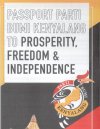
North Borneo is a rich state. It has a large petroleum and gas field, coal and other natural resources. North Borneo’s GDP for 2016 is RM73.8 Billion (USD 18.9 Billion). If North Borneo is a rich state, why does it look poorer and more backwards than most of the states in the Malaysian Peninsula?

Geographically, North Borneo is a mountainous country dominated by highlands that stretched all along the west coast well into the interior. These highlands, known as the Crocker Range, is the backbone of North Borneo and holds one of the United Nations World Heritage Site. With this recognition, a large area of the Crocker Range has been gazetted as Nature Reserves, thus excluding them from further development. To the east coast, we have the Brassey Range that includes the Kinabatangan Delta. These high, mountainous ridges and the vast area of the river delta are difficult to develop. Moreover, government initiatives has gazetted this area as nature reserves. That explains why North Borneo is still covered with lush greenery rather than tall skyscrapers and neon lit streets with all its fancy antics like any other places in Malaysia.
To judge a book by its cover does not apply when you are in North Borneo. Demographically, most of us North Borneans lives in a well proportioned population all over the state. It means that no matter how lucrative Jesselton (Kota Kinabalu), Sandakan or Tawau is, most of our younger generation would prefer not to flock into these big towns. Culture wise, most of us prefer our old rustic lifestyle. When you go for a stroll in the interior or some random villages, expect to see us in our simplest way of life. It is not that because we don’t live in a well furnished concrete bungalows or lives a lavish, luxurious lifestyle gives the verdict that the people of this state as poor or backward. We are a hardworking community. We are independent. We are self-sufficient. We are used to the toils of life. Honestly, we fair better in thriving economically compared to the other states, given the conditions of the country’s economy nowadays. We may not be stylish and a little high end fashionistas, but rest assured, those many dirty looking families who lives in a mare’s nest and do farming for their livelihood has more money in their coffers compared to most middle-class families in the Malaysian Peninsula.









